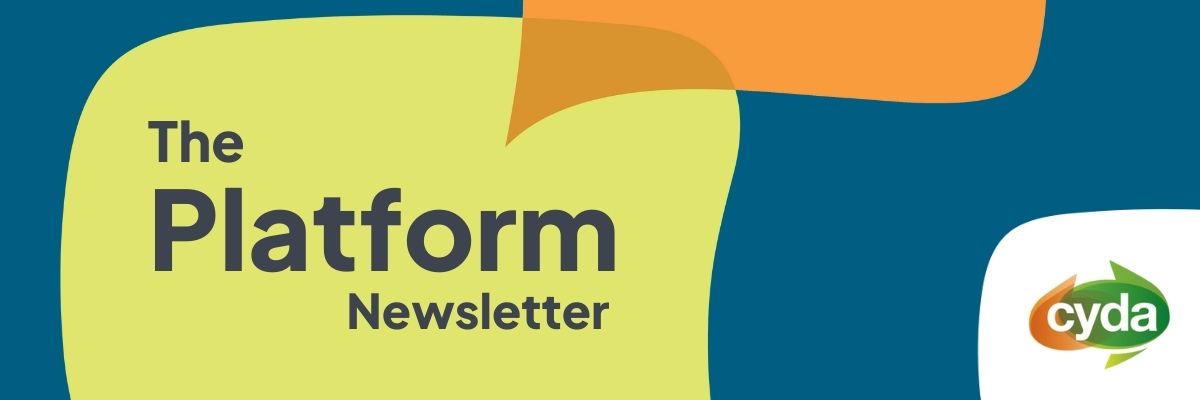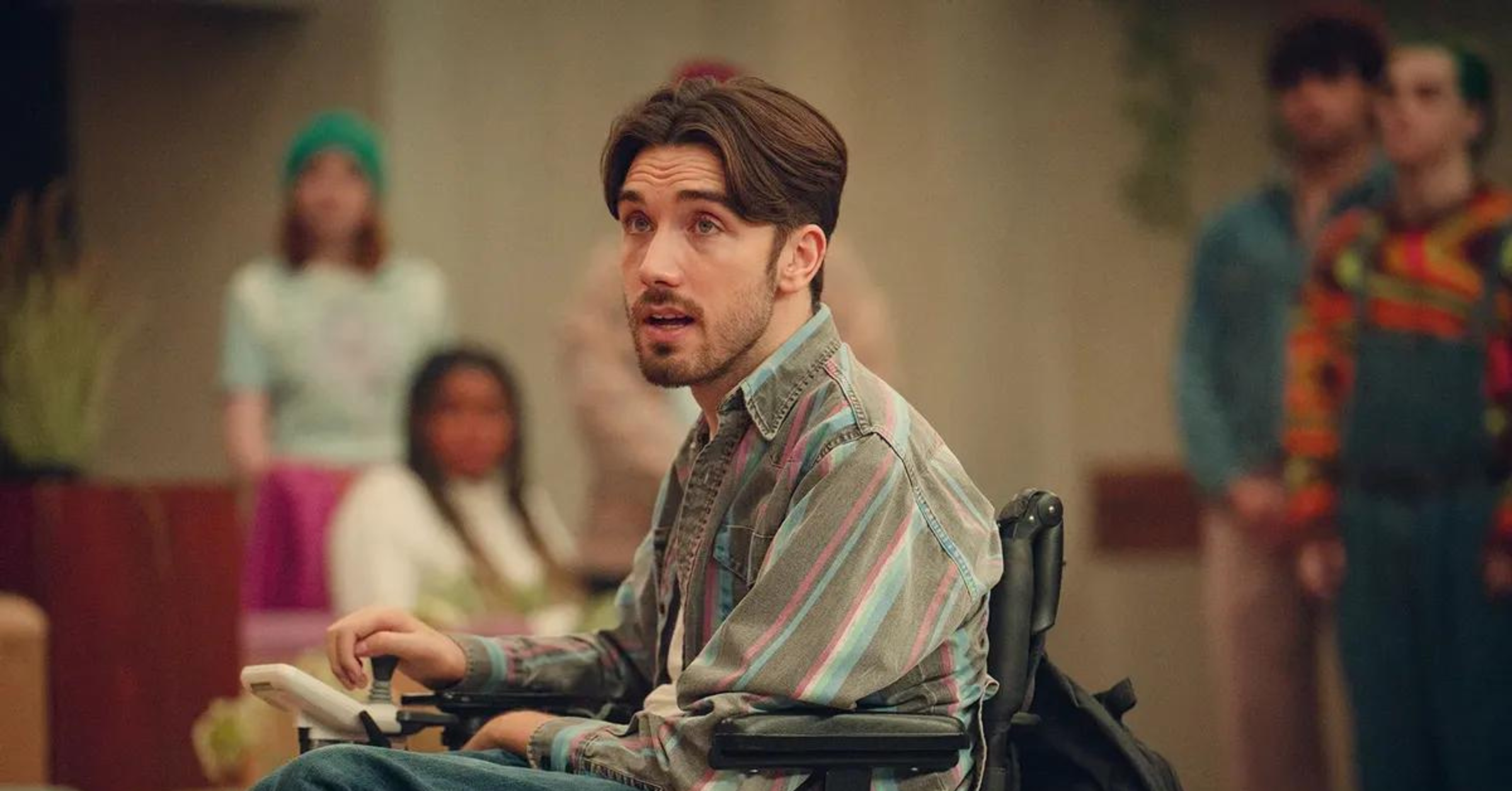Sex Education puts the social model of disability into action
Caitlin Blanch writes about Netflix’s Sex Education’s provocative take on the social model of disability.
Teary-eyed and well behind on my study for the day, my procrastination had finally served me. I sat at my laptop, chin nestled on my knees, and settled in to watch season four of Netflix’s ‘Sex Education’ – a reward for my relentless soul-searching through textbooks and syllabi.
I have long pined for my own revolution: hands linked and united in solidarity to collectively stomp on injustice. And it was episode seven that spoke to this part of my yearning. Its cinematic climax of fire alarms ringing and frantic scurrying held a deep significance for society and people with disability.
In it, Aisha, a student character that is hard of hearing, is left confused as their school’s alarm bells sound, the loud ruckus meaningless. Looking around, they watch their peers exit the classroom and quickly follow.
“Descend the stairs,” the teacher tells his class without hesitation or consideration of Aisha, but the stairs are obstructed, deliberately blocked by chairs and bean bags, and the school’s lifts cannot be used during a fire. Although the students are ‘capable’ of escaping, the only path that they can use to flee is not made available to them.
It is then, at the bottom of the staircase, that Issac emerges. He is an electric wheelchair user and a deadpan comedic genius who has orchestrated the crisis. Instead of worrying about trivial things like what’s for dinner, he is made to “[waste his] time explaining why accessibility is a big deal when it should be a given”.
He has made the school stop to make this point.
Seemingly, the lifts that are unusable during a fire also only operate at their discretion at any other point during the day. Whilst Issac’s lighthearted and often humorous banter resonates deeply with my inner commentator, his frustrations with people and machines, and his constantly fighting a fight that should not even be up for discussion, is all too real.
It’s like those dreams where you are in some absurdly dire situation and you’re trying to scream, and nothing comes out. The idea that people with disability are vulnerable, especially at these critical points of survival, dismisses that society has only made one path.
Like the stairs, it is the belief that we should all fit in the same box and progress at the same pace, but it does not work for all of us. We can try to fit different molds and archetypes, but we cannot all conform. And without stopping to consider that the blockades are manmade, we cannot progress.
It is alienating.
Back in the scene, a chorus of young voices, disabled by a one-size-fits-all approach to accessibility, come together in a monumental way. One unnamed passionate student highlights: “I wish people understood that our problems come from barriers in society, not from our disabilities.” In that instance, ‘Sex Education’ brought to light some of the most contentious aspects of disability philosophy.
I spent a large portion of my HSC reading about the discourses of the disability rights ‘movement’. My passion for social and systemic activism underpinned two of my major works. As a self-proclaimed perfectionist and a procrastinator, choosing two major works was not the most logical decision but it challenged me to think about disability differently, to connect and empathize with myself.
I learnt of the medical, charity, and social models of disability, of their divisive nature, their ongoing impact on how we culturally define disability, and how individualized and dynamic lived experience is. Our environment both prohibits us and empowers us. Our viewpoints, our movements, and our choices are all informed by the boxes we live and categorize ourselves in. The medical model has often defined disability as an ‘impairment’, ‘handicap’, or innate ‘barrier’ to living a ‘meaningful’ and ‘fulfilling’ life. Yet, what is viewed as ‘accepted’, has come under immense scrutiny by the disability community and our allies. We are shifting from one box to another, limitless but still confined by our society’s narrow view of what it means to live with disability.
Netflix co-created ‘Sex Education’ with lived experience, allowing for a more refined representation of what it is like to live with disability today. To finally see some bit of ourselves in their teenage angst, to feel seen. This is what makes this series unique. It is informed and guided by us, for us, our gaze and our comedic relief. We are holistic individuals with ambition, and imperfection, and a thirst for a bitta livin’, “not your inspiration” to quote the infamous Stella Young.
Whilst “it’s so draining” trying to educate and persuade others that our rights are human rights, Sex Education has shown society’s ignorance. Disability is not an ‘obstacle’ to be overcome, it needs to be accommodated infrastructurally and attitudinally. The lift needs to be fixed just as much as the staircase needs to be cleared.
The social model recognizes the need for a change in perspective, to think critically about disability, and to confront the status quo. What we have believed as true is more so a set of widely accepted norms and behaviours, routines and conditions, the ‘it is what it is.’ Sex Education put the social model of disability into action in an obvious way, and it was provocative.
But if my procrastination has taught me anything, it is that there is always time…until there isn’t. And the disability community’s tolerance is waning. When Sex Education’s representation is considered progressive (even though the social model of disability was recognized by the United Nations from the 1980s), it shows that we need to spend more time listening to, learning from, and actioning.
Because to quote Sex Education’s beloved Issac: “quite frankly, I’m f*cked off” too.
This article is an extract from CYDA’s The Platform Newsletter. Receive monthly updates by subscribing below.

About the author:
Caitlin (she/her) is part of the class of 2023, completing her HSC in NSW. Caitlin is passionate about challenging the stereotypes of disability and empowering youth to lead with self-agency and confidence. She is interested in policy/law and advocating for an inclusive and accommodating Australia. Caitlin enjoys reading, binge-watching tv series, spending time with her chickens and sheep, and a good chai tea!

The Platform is our newsletter for young people with disability, featuring interviews, opportunities and news on the issues that matter to you!


